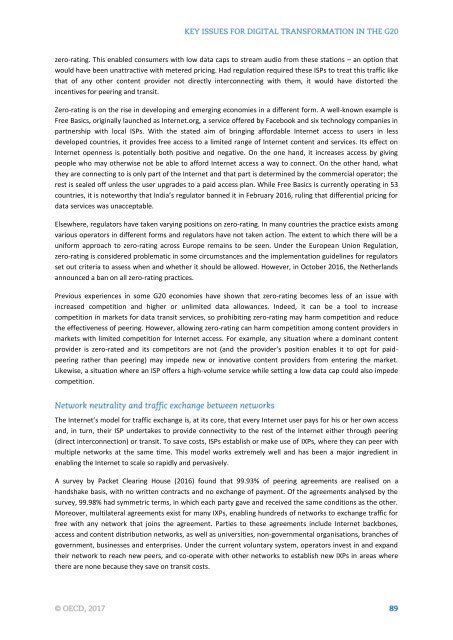KEY ISSUES FOR DIGITAL TRANSFORMATION IN THE G20
2jz0oUm
2jz0oUm
You also want an ePaper? Increase the reach of your titles
YUMPU automatically turns print PDFs into web optimized ePapers that Google loves.
zero-rating. This enabled consumers with low data caps to stream audio from these stations – an option that<br />
would have been unattractive with metered pricing. Had regulation required these ISPs to treat this traffic like<br />
that of any other content provider not directly interconnecting with them, it would have distorted the<br />
incentives for peering and transit.<br />
Zero-rating is on the rise in developing and emerging economies in a different form. A well-known example is<br />
Free Basics, originally launched as Internet.org, a service offered by Facebook and six technology companies in<br />
partnership with local ISPs. With the stated aim of bringing affordable Internet access to users in less<br />
developed countries, it provides free access to a limited range of Internet content and services. Its effect on<br />
Internet openness is potentially both positive and negative. On the one hand, it increases access by giving<br />
people who may otherwise not be able to afford Internet access a way to connect. On the other hand, what<br />
they are connecting to is only part of the Internet and that part is determined by the commercial operator; the<br />
rest is sealed off unless the user upgrades to a paid access plan. While Free Basics is currently operating in 53<br />
countries, it is noteworthy that India’s regulator banned it in February 2016, ruling that differential pricing for<br />
data services was unacceptable.<br />
Elsewhere, regulators have taken varying positions on zero-rating. In many countries the practice exists among<br />
various operators in different forms and regulators have not taken action. The extent to which there will be a<br />
uniform approach to zero-rating across Europe remains to be seen. Under the European Union Regulation,<br />
zero-rating is considered problematic in some circumstances and the implementation guidelines for regulators<br />
set out criteria to assess when and whether it should be allowed. However, in October 2016, the Netherlands<br />
announced a ban on all zero-rating practices.<br />
Previous experiences in some <strong>G20</strong> economies have shown that zero-rating becomes less of an issue with<br />
increased competition and higher or unlimited data allowances. Indeed, it can be a tool to increase<br />
competition in markets for data transit services, so prohibiting zero-rating may harm competition and reduce<br />
the effectiveness of peering. However, allowing zero-rating can harm competition among content providers in<br />
markets with limited competition for Internet access. For example, any situation where a dominant content<br />
provider is zero-rated and its competitors are not (and the provider’s position enables it to opt for paidpeering<br />
rather than peering) may impede new or innovative content providers from entering the market.<br />
Likewise, a situation where an ISP offers a high-volume service while setting a low data cap could also impede<br />
competition.<br />
The Internet’s model for traffic exchange is, at its core, that every Internet user pays for his or her own access<br />
and, in turn, their ISP undertakes to provide connectivity to the rest of the Internet either through peering<br />
(direct interconnection) or transit. To save costs, ISPs establish or make use of IXPs, where they can peer with<br />
multiple networks at the same time. This model works extremely well and has been a major ingredient in<br />
enabling the Internet to scale so rapidly and pervasively.<br />
A survey by Packet Clearing House (2016) found that 99.93% of peering agreements are realised on a<br />
handshake basis, with no written contracts and no exchange of payment. Of the agreements analysed by the<br />
survey, 99.98% had symmetric terms, in which each party gave and received the same conditions as the other.<br />
Moreover, multilateral agreements exist for many IXPs, enabling hundreds of networks to exchange traffic for<br />
free with any network that joins the agreement. Parties to these agreements include Internet backbones,<br />
access and content distribution networks, as well as universities, non-governmental organisations, branches of<br />
government, businesses and enterprises. Under the current voluntary system, operators invest in and expand<br />
their network to reach new peers, and co-operate with other networks to establish new IXPs in areas where<br />
there are none because they save on transit costs.


